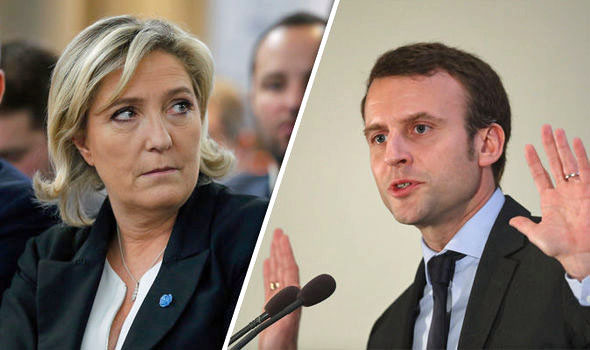
Geoffrey M. Hodgson
In the May 2017 run-off between Emmanuel Macron and Marine Le Pen, the defeated first-round candidate Jean-Luc Mélenchon refused to endorse the liberal Macron over the neo-fascist Le Pen. Many of Mélenchon’s leftist supporters did the same, arguing positively for abstention.

Jean-Luc Mélenchon
The abstainers argued widely that Macron is a “neoliberal” and the voters faced a choice between the dictatorship of the market or a fascist president.
This failure to perceive any advantage of a pro-market liberal over the racist and neo-fascist authoritarian nationalism of Le Pen’s National Front, is a symptom of a deep ideological sickness that has endured for decades on the French Left.
The political degeneration of the French Left, which even exceeds that of its Corbynista counterpart in Britain, would be the subject of another blog. My purpose here is to focus on the abuse of the term “neoliberalism” and how this corrupted and overly-widened word has poisoned political discourse.
I also wish to show how some “neoliberals”, who do not include Macron, and whom I shall attempt to characterise more precisely than the n-word will allow, do indeed have connections with genuine fascism.
After the erosion of credibility in classical socialism, particularly after its failed experiments in the twentieth century, it must be understood that our sole alternative to the rising nationalisms of Le Pen, Trump, Putin, Xi, Erdoğan and others is a modern and democratic version of liberalism. Whatever his flaws, Macron fits into the latter category.
The degeneration of the “neoliberalism” label
The widespread use of the word “neoliberal” to describe anyone accepting a significant role for private property or markets has made the word so imprecise that it has become useless and beyond reform.
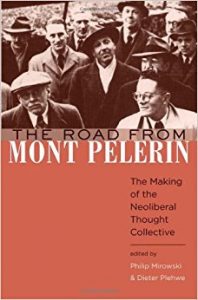 Even the foremost historians of “the neoliberal project” have acknowledged the problem. Philip Mirowski and Dieter Plehwe wrote:
Even the foremost historians of “the neoliberal project” have acknowledged the problem. Philip Mirowski and Dieter Plehwe wrote:
“We can sympathize with the impatience for those who use the term ‘neoliberalism’ as a blanket swearword for everything they despise, or a brainless synonym for modern capitalism.”
Colin Talbot pointed out that “neoliberalism” has become “a term of abuse” to be used against “any type of pro-market reform or political position that recognizes markets may – in the right circumstances – be a good thing”. Consequently, everyone “from moderate social democrats to the most lurid free-marketeers gets lumped together under a convenient ‘neoliberal’ label.”
In a superb survey of its usage since the 1980s, Rajesh Venugopal concluded that “neoliberalism has become a deeply problematic and incoherent term that has multiple and contradictory meanings, and thus has diminished analytical value.”
Some may wish to retain the “neoliberal” label, to apply it to those free marketeers who attempt to shrink radically the size of the state, to privatise anything that walks, advocate economic austerity and deregulate the financial sector. This would certainly separate neoliberalism from the genuine liberalism of John A. Hobson, William Beveridge or John Maynard Keynes.
But I think that things are too far gone to allow any useful redefinition of the “neoliberal” label to succeed. It is perhaps best abandoned. Instead I wish to focus on a particular strain of so-called “neoliberalism”. This allows us to concentrate on some key issues.
Ludwig von Mises and fascism
Ludwig von Mises (1881-1973) and Friedrich Hayek (1899-1992) were key figures in the so-called Austrian school of economics. Among their major achievements were their contributions to the “socialist calculation debate” where they showed the practical and epistemic limitations of any system of national planning based on comprehensive public ownership.
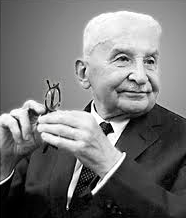
Ludwig von Mises
While sharing with liberals the support for a market economy based on private ownership, von Mises and Hayek departed from both classical liberalism (of John Stuart Mill, for example) and from twentieth-century liberalism (of John A. Hobson, John Dewey and John Maynard Keynes, for example), in some important respects.
In a book originally published in 1927, Ludwig von Mises praised fascism as “an emergency makeshift” that “has, for the moment, saved European civilization”. This statement cannot be excused, despite the facts that it was in a book that was otherwise devoted to the promotion of classical liberal values, and that von Mises was a Jew who eventually had to flee the Nazis.
From 1932 to 1934 von Mises continued as an economic adviser in Austria, even to the “Austro-fascist” or “clerical fascist” government of Chancellor Engelbert Dollfuss, who assumed dictatorial powers, closed down parliament, smashed the trade unions, and banned several political parties. This does not mean that von Mises was a fascist, but other economists would have drawn the line at advising them.
Friedrich Hayek and the dictatorship of Augusto Pinochet
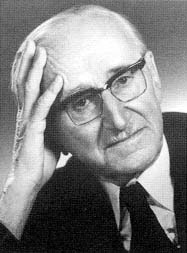
Friedrich Hayek
The idea that temporary dictatorships, even if murderous, might sometimes be necessary rubbed off onto von Mises’ student, Friedrich Hayek. Hayek argued that democracy, while desirable, can be temporarily dispensable, particularly in defence of private property.
Augusto Pinochet may have saved private property rights in Chile. But he imposed a vicious dictatorship that tortured an estimated thirty thousand civilians and murdered over three thousand.
The right to life, and freedom from torture, are existentially more basic, and hence even more important, than the right to property. Hayek visited Pinochet’s Chile and he failed to condemn these atrocious abuses of human rights. Hayek’s silence over abuses of basic human rights cannot be excused by his age: he was still publishing major books in the 1970s.
The twentieth century teaches us that Marxist socialism crushes human rights and leads to dictatorship. While opposing Communism, von Mises and Hayek (temporarily) tolerated some dictatorships and their removal of some basic human rights, including the rights of habeas corpus and to live without torture.
While earlier liberals had emphasized human rights, private property rights and democracy, in their reaction against socialism, von Mises and Hayek seemed to elevate private property rights over everything else. But private property rights require the protection of all actual or potential owners from torture or extermination. Basic human rights and democracy are vital, as well as the right to private property.
The Mont Pèlerin Society
The ideas of Mises and Hayek were prominent in the Mont Pèlerin Society, founded in Switzerland in 1947. The society accommodated a variety of views, including mainstream liberals plus some members who had collaborated with Nazism in the 1933-1945 period.
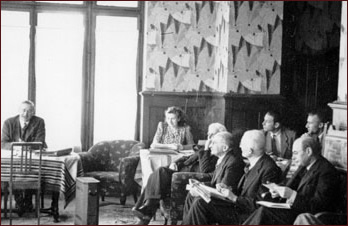 The Mont Pèlerin Society was dominated by economists. No less than eight winners of the Nobel Prize in economics have been its members.
The Mont Pèlerin Society was dominated by economists. No less than eight winners of the Nobel Prize in economics have been its members.
The influence of economists is evident in the draft statement of aims of the Society. It opened with these words:
“Individual freedom can be preserved only in a society in which an effective competitive market is the main agency for the direction of economic activity. Only the decentralization of control through private property in the means of production can prevent those concentrations of power which threaten individual freedom.”
Agoraphobics (i.e. fearers of markets) such as George Monbiot and Naomi Klein will probably disagree, but there is a vital truth in this quotation.
The trouble is that it is also a half-truth. Private property and markets are necessary but insufficient to guarantee liberty, as countless market-based totalitarian regimes, from Putin’s Russia to Pinochet’s Chile, will testify. The Mont Pèlerin statement should have made this clear. Instead it gave licence to a view that only private property and markets matter.
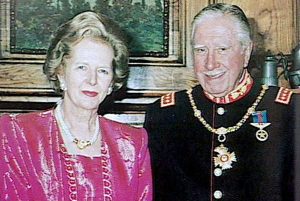
Margaret Thatcher and Augusto Pinochet
Hence Mont Pèlerin fans, including UK Prime Minister Margaret Thatcher and US President Ronald Reagan, supported dictatorships and opposed sanctions against South African Apartheid.
In 1999, Thatcher even thanked the former dictator Pinochet for “bringing democracy to Chile”. Clearly, while addressing someone who in 1973 overthrew a democratically-elected government, she invested the term “democracy” with an esoteric, Thatcherite meaning. In truth, Pinochet was a torturer and an assassin.
Vital differences between liberalism and Mont Pèlerin neoliberalism
Even with this brief account we can see some wide, clear water between mainstream liberals such as Macron and Mont Pèlerin “neoliberals” such as Hayek. Unlike those “neoliberals”, modern liberals uphold the following five points:
-
While markets and private property are essential, they are not sufficient to guarantee human rights and liberty. Vigilance and debate, within a democratic system with a free press, are necessary as well.
-
Dictatorships, would-be dictators and all abuses of human rights must all be condemned, in market-based as well as in centrally-planned societies.
-
-
Because the owners of capital and labour do not, and cannot, meet on a level playing field, some legally-limited trade-union activity is warranted, along with reasonable employment rights and other protections.1
-
While early liberalism was born in an era of small-scale producers, modern industrial capitalism bestows an economic (alongside a moral) need for organized mass education, social security and healthcare, along with regulations and bureaucracies to ensure that markets worked effectively and consumers are protected.
If these liberal principles were understood, along with Macron’s support for them, abstention in the May 2017 French presidential elections would be impossible.
28 April 2017
Minor edits 1, 4 May – thanks to Pedra Pereira Hors.
|
My forthcoming book elaborates on some of the political issues raised in this blog:
Wrong Turnings: How the Left Got Lost
To be published by University of Chicago Press in December 2017
|
Endnote
-
Note that Macron (like his Socialist Party predecessor François Hollande) wants to reform the blundering and counter-productive French system of employment law, rather than to abolish all employment rights, which must at least conform to standards within the European Union.
References
Caldwell, Bruce J. and Montes, Leonidas (2015) ‘Friedrich Hayek and his Visits to Chile’, Review of Austrian Economics, 28(3), pp. 261-309.
Hodgson, Geoffrey M. (2016) ‘Some Limitations of the Socialist Calculation Debate’, Schmollers Jarhbuch, 136, pp. 1-26.
Hodgson, Geoffrey M. (2017) Wrong Turnings: How the Left Got Lost (Chicago: University of Chicago Press, forthcoming).
Mirowski, Philip and Plehwe, Dieter (eds) (2015) The Road from Mont Pèlerin: The Making of the Neoliberal Thought Collective, paperback edition (Cambridge MA: Harvard University Press). (Quote from p. xvii.)
Mises, Ludwig von (1985) Liberalism in the Classic Tradition. Translated by Ralph Raico from the German edition of 1927 (Irvington, NY: Foundation for Economic Education). (See pages 47 and 51.)


 Even the foremost historians of “the neoliberal project” have acknowledged the problem. Philip Mirowski and Dieter Plehwe wrote:
Even the foremost historians of “the neoliberal project” have acknowledged the problem. Philip Mirowski and Dieter Plehwe wrote:

 The Mont Pèlerin Society was dominated by economists. No less than eight winners of the Nobel Prize in economics have been its members.
The Mont Pèlerin Society was dominated by economists. No less than eight winners of the Nobel Prize in economics have been its members.
https://mises.org/blog/mises-fascism-again
Thanks Louis for this link, which everyone interested in von Mises should read.
Pingback: Marxism, neoliberalism and the roots of dictatorship – New Politics
Thanks for this article. Good points and food for thought as someone who has read and follows Monbiot. What is your take on Mark Blyth’s trumpism and analysis of why the Clinton Democrats lost? I find it quite compelling – that the elite liberal class bubble of the Clinton democrats are actually to blame in terms of their uncompelling and narrow narratives and detachment from the average US citizen. Blaming those calling them neoliberal seems far fetched and not at all causal, especially if the reason for their fall was because they no real critique of finance and wealth inequality, are and perceived to be funded by and supported by Wall Street, and were / are dmismissive of the common / average middle / working class person who feels screwed over by the system. Contrast Clinton to say Elizabeth Warren and Bernie who make way more compelling cases of reform and change to the average person. Even if neoliberalism became used incorrectly as a simple catch all term for this docontent, they must have had it coming anyway?
Sorry this comment was for the article: Agoraphobics blame neoliberalism for Trump